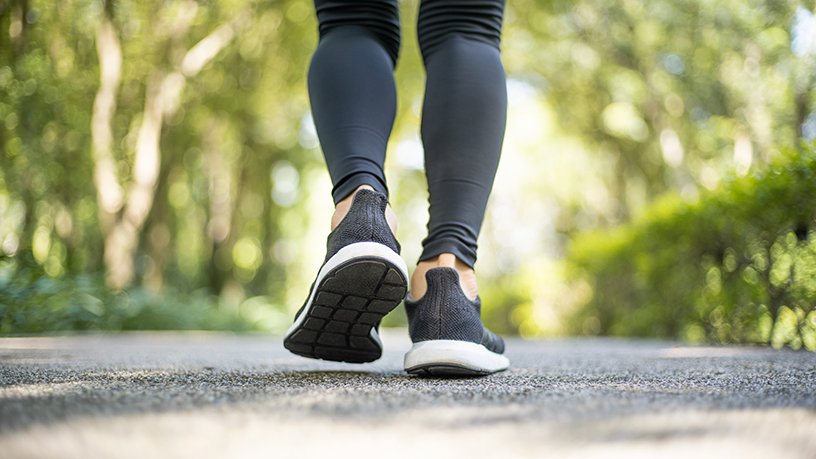Key takeaways
- Walking is an important part of staying fit and healthy, but it can also help to boost your mood.
- Regular walks are shown to improve a range of mental health issues, including anxiety and depression.
- Walking with other people may hold added benefits for your mental health.
We all know that walking is great for physical health. But have you considered the power it can have on your mental health?
“Walking improves mood,” says Nadeena Thenabadu, Head Physiotherapist of Melbourne’s Head2toe Physiotherapy and Podiatry.
One recent study found 2.5 hours of brisk walking every week can reduce your risk of depression by 25%.1 Regular walking can also help:
- reduce stress and anxiety
- improve your ability to focus and remember things
- improve your sleep
- make you more resilient
- distract you from negative thoughts.2
How, exactly?
According to Nadeena, there are several reasons, which are physical, environmental and even social.
“Exercising releases endorphins, our feel-good hormones, in our body, which can help regulate our thinking [and] make us feel better about ourselves,” he says.
“Sunlight also brings in a lot of vitamin D, which can help with hormone and mental regulation.”
Nadeena adds that he has noticed a positive affirmation effect among his clients who work towards a physical goal like regular walking.
“They can feel better about themselves, how they look, how they feel.”
The social benefits of walking
Walking and talking go together like a breeze on a warm day. And, in case you needed more of a reason to get out and active with other people, studies have found that walking in groups can improve mental health issues like depression.3
“It helps me deal with anything that happens in my life,” says Corey McKernan, former AFL footballer and Founder of Walk With Me, a not-for-profit initiative that connects people on their own walks via Zoom.
Everything feels a little easier just by getting moving, getting the blood flowing and changing your environment, just by getting outside.
Corey started the virtual walking group during the COVID-19 pandemic to help connect people who were walking on their own. It was, he says, “one of the good things that came out of the pandemic. Even though it was over Zoom.”
What Corey found was the act of walking as a group, even virtually, made you more accountable.
“If you make a commitment to one of your mates, and you know you're going to go for a walk, it definitely creates that sense of community and accountability.”
“The other thing that happens when you walk and talk: It's amazing how quickly that time goes,” he adds.
How to make walking a more regular part of your life
1. Don’t build it up too much and just get out there
Once you’re actually out there, your mind and legs generally take care of the rest.
“You're getting your blood flowing,” says Corey. “You may have days where you might want to walk for an hour but only have 10 minutes,” which is fine, he adds.
2. Get a mate involved
Getting friends or family involved in your walks is a great way to hold yourself (and them) accountable.
“If you make it a regular thing, it's going to push you,” says Corey. “On certain days, we're all not going to feel at the top of our game. You might then lift your mate on different days when they’re not travelling so well.”
3. Get prepared and set the intention
For Corey, preparing for a walk ahead of time and setting the intention to actually get out there can ease things along, particularly when you’re not feeling motivated.
“Falling back on your preparation makes it easier,” he says. “Being prepared [with] your gear, your runners. Even if you haven't had a good sleep or something's happened, at least you cut down on the amount of things that are going to stop you by getting everything out the night before.”
4. Practise mindfulness
Corey says that he wishes he was given this piece of advice when he played in the AFL: Practise mindfulness.
Mindfulness is an umbrella term for wellness techniques that are designed to focus your mind, body and breath. This includes yoga, breathwork and meditation, all of which can help improve your overall fitness and mental health.
When it comes to walking, one study found that adding mindfulness to walking can make it more enjoyable and feel easier, helping people stick with it in the long term.4
“Whether it's breathwork, meditation or even just 5 minutes to gather your thoughts and give yourself some time out. I'd recommend that anyone have a crack.”

At Bupa, trust is everything
Our health and wellbeing information is regularly reviewed and maintained by a team of healthcare experts, to ensure its relevancy and accuracy. Everyone's health journey is unique and health outcomes vary from person to person.
This content is not a replacement for personalised and specific medical, healthcare, or other professional advice. If you have concerns about your health, see your doctor or other health professional.
1Pearce M, Garcia L, Abbas A, et al. (2022). Association Between Physical Activity and Risk of Depression: A Systematic Review and Meta-analysis. JAMA Psychiatry, 79(6):550-559.
2Heart Foundation. (2024). The benefits of exercise on mental health. National Heart Foundation of Australia.
3Hanson, S. & Jones, A. (2015). Is there evidence that walking groups have health benefits? A systematic review and meta-analysis. British Journal of Sports Medicine, 49(11), 710-715.
4Cox, A. E., Roberts, M. A., Cates, H. L., & McMahon, A. K. (2018). Mindfulness and Affective Responses to Treadmill Walking in Individuals with Low Intrinsic Motivation to Exercise. International journal of exercise science, 11(5), 609-624
You might also like
The power of walking
A simple stroll can be an overlooked activity with many health benefits. Find out how getting your daily steps in can help you march towards a healthier, happier you.
Why 10,000 steps? A simple path to a healthier you
You’ve probably heard that 10,000 steps a day is important for your health, but have you ever stopped to ask why?
5 ways to track your steps
Tracking your steps can be simple with the right tool. Discover 5 easy ways to make sure you’re hitting your targets.
4 ways to sneak more steps into your day
It can feel hard to get in those 10,000 steps in this busy world. But it might be easier than you think.





